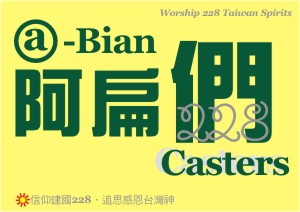2009年9月9日 星期三
我在看守所見到陳水扁(家博(J. Bruce Jacobs))
本周稍早,我有幸成為第一批前往土城看守所探視前總統陳水扁的外國人之一。一名台灣友人和我進入一間標示為「重刑接見室」的房間,門外還加註上中式英譯「Felonry Reception Room」。這意味著陳水扁已被視為犯下重罪的犯人,儘管在被收押的近10個月中,他仍未因任何罪行被定罪。
這次探視限制極嚴。我們只能隔著兩片隔絕空氣的厚玻璃和堅固的鋼條與陳水扁會面。這些限制阻隔所有聲音,我們只能用電話交談。電話老舊,不時傳出雜音。獄方顯然在監聽我們的談話。
司法媒體改革太慢
我們不能帶任何東西進入接見室,所以無法記錄陳水扁的話。另一方面,獄方行事客氣又有效率,並未刁難我們。
我應該一開始就解釋,陳水扁執政期間我經常公開批評。此外,我與陳水扁相識多年,這並不特別。因為我也認識前總統李登輝近15年,與馬英九總統相識8年。
包括我在內的許多外國觀察家曾嚴厲質疑台灣司法的運作。按慣例,台灣侵占公款和貪污的嫌犯,並不需要在定罪前收押。例如,2007年2月13日,馬英九因貪污罪名遭起訴,儘管起訴罪狀重大,但直到當年8月14日他被判無罪為止,他一直保有自由之身。
此外,除了陳前總統,沒有人因為貪污起訴被定罪以前,就被關進大牢。
為何陳前總統會成為唯一因為貪污起訴就坐牢的人?許多觀察家都提到,民進黨2000年執政時,曾讓許多國民黨官員繼續在位。反觀國民黨去年重新掌權,很快就擺脫民進黨官員,立即從黨內找人補位。
許多觀察家認為,現在的國民黨政府對陳水扁恨之入骨,希望黨能盡其所能把陳水扁關在大牢,越久越好。民主制度的難處在於,選民常會拋棄政府,讓反對陣營出頭。正如誰能預測幾年前位高權重、掌管政府所有部門的美國共和黨,會在2008大選受到重挫?
同樣地,大權在握的國民黨今年已經面臨許多問題,例如經由莫拉克風災凸顯的官僚無能。未來的民進黨政府是否會使出未審先押、甚至長期監禁的手段,對國民黨還以顏色?
民主化的台灣面臨的另一個問題就是:司法和媒體的改革太慢。許多在威權時代奠定根基的報紙和電視台,至今仍在民主的台灣推動相似的理念。
法官聽審明顯操弄
以前的司法制度中有太多沒有經驗的「菜鳥」法官、剛從法律系畢業的檢察官。這些人考試成績一流,但缺乏人生經驗。許多人所受的訓練就是,接受國民黨指示,處理司法案件。法官聽審陳水扁案時的明顯操弄,令人擔心過去那套做法仍然持續。
幸運的是,這件事不算糟糕透頂。在海外出現抗議聲浪後,司法部長王清峰表示,讓陳水扁戴上手銬是不恰當做法,陳水扁現在進出法庭無須戴上手銬。此外,陳水扁看來還算健康。與之前的照片相比,他看起來瘦了一點,但是精神奕奕。透過厚玻璃和鋼條,他說看似我們這些訪客在坐牢,而他感覺自由無拘。
事實是,我們雖被鎖在接見室內,但我們的大門最終還是敞開。當我們走出去後,陳水扁仍得回到牢房。
作者為澳洲蒙納士大學亞洲語言與研究講座教授暨台灣研究室主任
延伸閱讀
e世代探訪阿扁總統的過程與心得
大地青年志工隊到土城看守所探訪陳水扁總統
贊決送溫暖給阿扁總統--土城記事
贊浬台北看守所探訪阿扁總統紀實
贊揚同修探訪阿扁總統紀實
閃靈Freddy探視阿扁總統
贊郡探訪阿扁總統之行
英文原文出處
Taiwan’s legal system and Chen
By Bruce Jacobs 家博
Friday, Sep 04, 2009, Page 8
‘Why is Chen the only person detained in prison on corruption charges before being convicted?’
Earlier this week I was one of the first foreigners to visit former president Chen Shui-bian (陳水扁) at the Taipei Detention Center in Tucheng (土城). The visit was severely restricted. We saw Chen through two very thick panes of glass separated by insulating air as well as substantial vertical steel bars. No sound could penetrate this barrier and we talked with Chen though phones that were old and had a scratchy sound quality. As we could easily see, guards monitored our conversation.
We could not take anything into the reception room, even a notebook or a pen, so we could not record what Chen said. On the other hand, prison officers were polite and efficient and did not hassle us in any way.
Every Monday to Friday, Chen is allowed one 30-minute visit with a maximum of two visitors. On the first Sunday of each month, he has an additional visit, though this too is limited to two people and 30 minutes and is also conducted by telephone through the thick bars and glass.
I should make clear at the outset that I have frequently and publicly criticized Chen’s presidency. In addition, my knowing Chen for many years is not unique because I have also known former president Lee Teng-hui (李登輝) for some 15 years and President Ma Ying-jeou (馬英九) for about eight years.
Many foreign observers, including me, have raised serious questions about the justice system in Taiwan. Traditionally, crimes of embezzlement and corruption in Taiwan have not required detention prior to conviction.
For example, after Ma was indicted on corruption charges on Feb. 13, 2007, he remained free, despite the severity of the charges, until found not guilty on Aug. 14 that year. Similarly, no one else indicted on corruption charges remains in prison prior to conviction, except Chen.
Why is Chen the only person detained in prison on corruption charges before being convicted?
Many observers have noted that when the Democratic Progressive Party (DPP) came into office in 2000, it retained many KMT office-holders. In contrast, when the KMT returned to power last year, it quickly got rid of DPP office-holders and filled positions from its own ranks.
Many observers believe that the current KMT administration genuinely hates Chen and they expect that the KMT will do its best to keep him in prison as long as possible.
The difficulty in a democracy is that the voters usually throw out the government and put in the opposition. A few years ago, who could have predicted that the high-riding Republicans in the US, who dominated all branches of government, would be so severely defeated last year?
Similarly, the high-riding KMT of last year is already facing many problems, including administrative incompetence, an incompetence highlighted by the devastation of Typhoon Morakot. Will a future DPP government pay back the KMT with pre-conviction detentions and possibly long jail terms?
Another problem facing democratizing Taiwan is that the areas of both justice and the media have been slow to reform. In the media, many newspapers and TV stations had their origins in the authoritarian period and they continue to push similar beliefs in democratic Taiwan.
The former justice system, too, had many inexperienced “baby” judges and prosecutors just out of law school who did well in examinations but who had no life experience. Many were trained to accept KMT guidance with respect to judicial cases. The apparent manipulation of the judges hearing Chen’s case raises many fears that past practices continue.
Fortunately, the story is not all gloomy. After protests from overseas, Minister of Justice Wang Ching-feng (王清峰) declared that the use of handcuffs on Chen was inappropriate and he now goes to and from the courtroom without them.
In addition, Chen looks quite fit. He has lost the extra weight he appeared to have in previous photos and he is alert with relatively high morale.
Looking out through the two thick glass panes and the thick steel bars, he said we — the visitors — looked like we were in prison, while he felt free.
In fact, we were locked inside the reception room, but our door was eventually opened and we came out, while Chen went back to his cell.
Bruce Jacobs is professor of Asian Languages and studies and director of the Taiwan Research Unit at Monash University in Melbourne, Australia.
This story has been viewed 1360 times.
Subscribe to:
張貼留言 (Atom)






0 Comments:
Post a Comment